Events
Coming events:
IHFES LunchNLearn November 2024 webinar_ Gaps and importance of human factors in aircraft design and maintenance (based on RAeS Human Factors Engineering Sub-Group 2022 report)
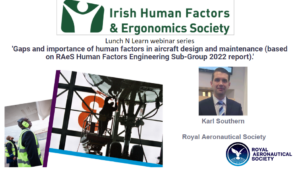
Date – Thursday 28rd of November 13.00 to 13:45 GMT
Topic – Gaps and importance of human factors in aircraft design and maintenance (based on RAeS Human Factors Engineering Sub-Group 2022 report).
Speaker: Karl Southern, Lockheed Martin UK
Bio:
Chartered Mechanical Systems Engineer, with a demonstrated history of working in the Aerospace production and design industries. Strong engineering professional with over 10 years industry experience, BEng (Hons) and a MSc. Security vetted and cleared up to SC level.
Abstract:
For more than 2 decades there have been consistent rates of error during aircraft maintenance. Efforts of regulators have focused on Maintenance Engineers and Organisations rather than the design of the aircraft itself. Flight deck requirements have accepted that design must accommodate for realistic human performance & error – why not design for maintenance in a similar fashion?This talk will advocate for a Human-centred design for maintenance approach to further error prevention and reduction during maintenance. Thus improving maintenance as imagined, maintenance as prescribed and maintenance as performed.
Join Zoom Meeting
https://zoom.us/j/97648633322?pwd=sj2qrK5HlVOONwaetk8x3hknq5z1ZL.1
Meeting ID: 976 4863 3322
Passcode: 191827
Past events:
IHFES LunchNLearn October 2024 webinar_Using a serious game to understand environmental and financial factors affecting home appliance repair/replace decision-making: findings and policy implications

Date – Thursday 24rd of October 13.00 to 13:45 GMT
Topic – Using a serious game to understand environmental and financial factors affecting home appliance repair/replace decision-making: findings and policy implications
Speaker: Dr. Paul Liston, Centre for Innovative Human Systems, TCD
Bio:
Dr Liston is a Chartered Ergonomist and Human Factors Specialist (C.ErgHF), Fellow of the Chartered Institute of Ergonomics & Human Factors (FCIEHF), and Member of the Irish Human Factors & Ergonomics Society (MIHFES). He has over 20 years’ experience in applied research, consultancy, proposal-writing, project management, training and teaching. Experience performing research and intervention-based work in the aviation, maritime, pharmaceutical, process, and construction sectors. His work is multi-disciplinary and focuses on understanding human behaviour and attitudes and more recently he is working on energy behaviour. Dr. Liston has significant experience in applying Ergonomics and Human Factors principles to real-life problems in order to achieve impact for stakeholders and users. Skilled at winning research funding for design and development projects incorporating social and behavioural perspectives (€1.7+ million in the last 5 years).
Abstract:
As efforts to empower consumers to repair home appliances increase, analysis of the behavioural biases driving premature replacement is needed. Serious games, such as the EVIDENT serious game, provide a promising means to explore these biases and aid consumer energy decision making. However, for serious games to be effective, they must be acceptable and usable, and accurately reflect real-world contexts. Key themes arising from focus group discussions on repair/replace decision making included what does it mean, invisible impacts, shifting cultural values and trust. These findings highlight the uniquely challenging nature of energy decision making, and the resulting need for multi-level interventions to increase repair, with the interconnecting role of individuals, businesses, communities, and policy clearly noted. Taken together, these results highlight the importance of user inclusion across the energy serious game design and piloting process to support both utility and broader social and ecological validity.
https://zoom.us/j/92421393399?pwd=MWkxUzFZUDJvMytmL0cydnR1R2lMUT09
Meeting ID: 976 4863 3322
Passcode: 191827
IHFES AGM
The Society will hold the Annual General Meeting on Friday 6th September 2024 at 12pm. All paid up members of the Society we welcome to join the meeting. If you would like to join the meeting, email info@ihfes.org to receive a link to the online meeting. Any motions to be considered at the AGM are to be sent to the Secretary via email to info@ihfes.org no later than Friday 23 August 2024.
Annual Conference 2024
Celebrating 30 years (1994-2024)
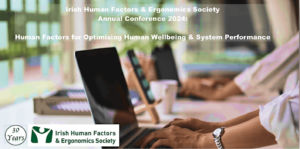
Human Factors for Optimising Human Wellbeing & System Performance
Themes: Design & Sustainability
Date: Full day conference, Tuesday 18th June 2024
Venue: Durkan Lecture Theatre, Trinity Centre for Health Sciences, St James’s Hospital, Dublin 8, D08 NHY1
Programme
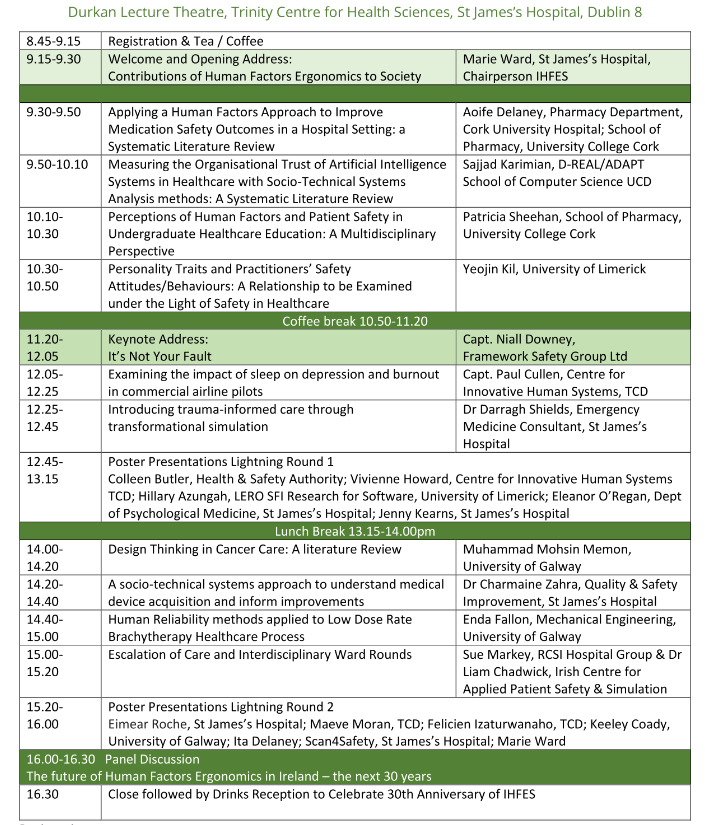
Registration
Registrations are still open, please register here.
One presenter per paper will have free registration to attend the conference.
Publication of Proceedings
Submissions chosen for presentation will be allocated a poster presentation or an oral presentation. Extended Abstracts and full Papers will be subject to peer review and reproduced in a book of proceedings titled “Irish Ergonomics Review 2024”. Proceedings have an ISSN number and will be available internationally through the British Library.
Conference Contacts:
- Prof. Marie Ward, Health Systems Research, St James’s Hospital & Centre for Innovative Human Systems, TCD
maward@stjames.ie, maward@tcd.ie - Dr Joan Cahill, Occupational Health, Health and Safety Authority, Dublin 1, D01 KOY8. Joan_Cahill@hsa.ie
- Dr Maria Chiara Leva, School of Environmental Health, Technical University Dublin. mariachiara.leva@tudublin.ie
- Dr Mahnaz Sharafkhani, Health Systems Research, St James’s Hospital & Centre for Innovative Human Systems, TCD. MSharafkhani@stjames.ie, sharafkm@tcd.ie
- Dr Diego Estrada Lugo, School of Environmental Health, Technical University Dublin. HectorDiego.EstradaLugo@TUDublin.ie
IHFES LunchNLearn May webinar_Learning from Incidents in Airworthiness: A Novel Framework Tool for Safety Analysis
Date – Thursday 23rd of May 13.00 to 13:45 GMT
Topic – Learning from Incidents in Airworthiness: A Novel Framework Tool for Safety Analysis
Speaker: Dr Seamus Clare, Irish Aviation Authority
Bio:
Dr Seamus Clare is presently employed in the aviation regulatory domain. Prior to taking up his current role almost 20 years ago, he has held several aviation industry positions in engineering, quality assurance and maintenance management in the preceding two decades. His current research interests include human factors, continuing airworthiness, learning from incidents and regulatory development.
Abstract:
Safe air travel is an expectation that we often invest little or no thought in. Fortunately, the industry has evolved to a stage where major air accidents are rare. Numerous lessons in aviation safety have unfortunately been paid for in the currency of human life. Many segments of the aviation industry support the idea that adverse and unwelcome events can be minimised through diligent reporting of incidents, event analysis and learning. The value of learning from incidents is not well supported in the implementing regulations. Therefore, little or no examination of learning inputs or outputs is required.
The intent of the talk is to provide insights of how various situations impact on learning from incidents in the continuing airworthiness management segment. To gain an empathetic understanding of the participants and their actions, an interpretative approach was adopted. An analysis of potential research methods and means of data collection was performed. Thirty-four semi-structured taped interviews were carried out. A qualitative analysis process based on Thematic Analysis employing a six- phase approach was used in support of the study.
The harvesting of information from incident reporting systems is a necessary input to continuously develop appropriate and effective training material. The inclusion of basic qualification criteria for human factor trainers in regulatory requirements should also be addressed. However, it is questionable if the perpetuation of these measures alone would support more effective delivery and application of lessons learned throughout the segment. One means of addressing this impending issue is to remodel regulatory, operational and training requirements to consider a new approach in the segment. Reflecting a combination of actions, events and conditions in a new basic model for human factor continuation training, may lay the foundations to better elucidate event causation and yield improved safety recommendations in the featured segment.
https://zoom.us/j/92421393399?pwd=MWkxUzFZUDJvMytmL0cydnR1R2lMUT09
Meeting ID: 924 2139 3399
Passcode: 769555
IHFES LunchNLearn April webinar_
Extended Reality for “Explainable” Human-Robot Collaboration
Date – Thursday 25th of April 13.00 to 13:45 GMT
Topic – Extended Reality for “Explainable” Human-Robot Collaboration.
Speaker: Mark Zolotas, Northeastern University
Bio:
Mark Zolotas received an M.Eng. (2016) and a Ph.D. (2021) from the Department of Electrical and Electronic Engineering at Imperial College London, UK. He then joined Northeastern University as a postdoctoral associate, before transitioning to a research scientist position in the university’s Institute for Experiential Robotics (2021-2024). Mark Zolotas has led multiple funded projects on collaborative robots and extended reality, including NSF and DARPA grants. His research interests span the domains of machine learning, shared control teleoperation, and extended reality interfaces to advance how robots interpret human behavior, provide autonomous assistance, and communicate with others. At the intersection of these interests is his overarching ambition to establish mutual understanding between humans and robots as they interact with one another.
Abstract:
In human-robot collaboration (HRC) applications, such as teleoperation, lack of user feedback can lead to critical task failures and heightened cognitive workload, as the robot’s behavior may not align with the outcomes intended by the human. For example, shared autonomy is an HRC paradigm that attempts to form a synergy between the high-level cognition of a user and the low-level autonomy of a robot. However, achieving this synergy is a challenging endeavor that largely depends on whether the user understands the assistance provided by the robot’s autonomy. Extended Reality (XR) headsets are an emerging technology in HRC aimed at addressing these discrepancies in the user’s mental model of the robot’s behavior. In this talk, I will present my work in XR for HRC as a step towards “explaining” the underlying autonomy to users.
Zoom link: https://zoom.us/j/98472120145?pwd=WUliR2ZlVnZnNVpydjIzUGlRbS9zUT09
Meeting ID: 984 7212 0145
Passcode: 117879
IHFES LunchNLearn March webinar_
From shaming and blaming to learning & just culture (Ukom)

Date – Thursday 21 March 2024 13:00 – 13:45 GMT
Topic – From shaming and blaming to learning and just culture: the role of the The Norwegian Healthcare Investigation Board (Ukom) in creating a just culture in the Norwegian healthcare system.
Speaker: Synnøve Serigstad, Norwegian Healthcare Investigation Board
Bio:
Synnøve Serigstad is head of relations, learning and quality improvement at The Norwegian Healthcare Investigation Board. She has been working at the Investigation Board since the very beginning in 2018. She is responsible for the development of a healthcare investigation method and process, the board`s internal education program and for ensuring that the board`s reports and recommendations are conveyed in a way that is both pedagogical and useful for the recipients. Before she started at her current job at the Investigation Board, Synnøve led the work of implementing the Norwegian national patient safety program “In Safe Hands 24/7” in the Western Norway Regional Health Authority.
Abstract:
The Norwegian Healthcare Investigation Board is an independent government agency. We investigate serious adverse events and serious patient safety concerns in Norway by taking the perspective of both the healthcare staff and patients and their families. We focus on the frame conditions for healthcare staff and leaders to provide safe care, by asking what happened and why did it happen, not who is to blame. The aim of our investigations is systemwide learning on a national level. We do not attribute blame or liability. And we make no references to the names and addresses of individuals involved. The location where the adverse event happened is as a general rule not disclosed, as we go into cases that could have happened everywhere in the Norwegian healthcare system.
Zoom link: https://zoom.us/j/94105033017?pwd=RGNuYW5sbUpjaTFlbnFJaC92VUlMZz09Meeting ID: 941 0503 3017
Passcode: 175155
IHFES LunchNLearn February webinar_
Building Information Modelling as OSH management tool
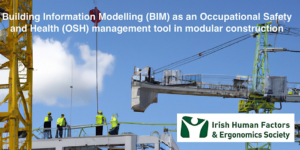
Date – 27th of February at 13:00 to 13:50 GMT
Topic – Building Information Modelling as OSH management tool
Speaker: Prof. Mikela Chatzimichailidou, University College London
Bio:
Mikela has been leading ground-breaking research and industry projects spanning healthcare, infrastructure and transportation, and is therefore in the rare position of being able to draw on both academic and industrial experience.
She has a PhD in Socio-Technical Systems Safety and Human Cognition. While in industry, she worked at WSP and Arup where she specialised in the organisational and technical integration of major infrastructure projects (e.g. HS2, Crossrail). She has also acted as the system safety technical lead for a variety of high-profile transportation, construction, and building projects. She was Arup’s Global Research Leader, and WSP’s R&D Functional Lead.
She is currently a full Professor in Design for Mobility, Health, People and Society at UCL Department of Civil, Environmental and Geomatic Engineering. She is also a member of the DfT College of Experts.
Abstract:
The talk is on Building Information Modelling (BIM) as an OSH management tool in modular construction. The focus is on the benefits and challenges of using these tools for OSH management. For example, the presentation will highlight the training, inspection, and crane management benefits. It will also cover the challenges, which could be accuracy of modelling, acceptance and use of digital tools, information overload, cost and more.
HFES LunchNLearn January webinar_
HF and Ergonomics of Brain-Computer Interfaces
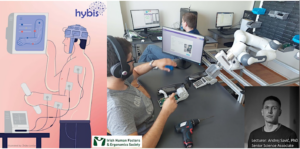
Date – 25th of January at 13:00 to 13:50 GMT
Topic – HF and ergonomics of brain-computer interfaces
Speaker: Dr. Andrej Savić
Bio:
Dr. Andrej Savić is affiliated with the Science and Research Centre of the University of Belgrade – School of Electrical Engineering (ETF) in the role of Senior Science Associate. His main research interests include biomedical engineering, neural engineering, and neuroscience, with specific expertise in “Brain-Computer Interfaces (BCI)” and “closed-loop neurotechnology.” He has actively contributed to numerous publicly and privately funded research projects, covering topics such as BCIs for stroke rehabilitation, assistive BCIs for ALS, hybrid BCIs, neuroergonomics, implantable neurotechnology, among others. He currently serves as the principal investigator for the HYBIS project funded by the Fund for Science of the Republic of Serbia, for excellent ideas from young researchers. In this role, he leads a team of four researchers from three Science and Research institutions affiliated with the University of Belgrade: ETF, Innovation Centre of ETF, and the Faculty of Medicine. Since 2016, Dr. Savić has held a lecturer position at the University of Belgrade, at multidisciplinary PhD studies in Biomedical Engineering and Technologies, Intelligent Systems, and Biophysics. He actively participates in supervising multiple PhD theses. Throughout his career, Dr. Savić has coauthored more than 80 scientific publications in peer-reviewed journals, books, and conferences. Additionally, he serves as a reviewer and editor for multiple international scientific journals.
Abstract:
Brain-Computer Interfaces (BCIs) are systems that enable direct communication pathway between the brain and an external device, such as a computer or a robotic system. BCIs are designed to interpret users’ brain activity in real-time and translate it into commands of the external device. Consequently, advanced in the Human Factors and Ergonomics field are tightly related to the field of BCIs. There is a two-way link between those fields. The relationship involves the influence of human factors principles on the design and usability of BCIs and, conversely, the impact of BCIs on human factors considerations. When applied to BCI development, this relation ensures that the interface is intuitive, user-friendly, and aligns with the cognitive and physical abilities of the users, while considering comfort, safety, and minimizing physical strain during BCI use. On the other hand, BCIs introduce novel interaction modalities that significantly broaden the scope of human-computer interaction. This includes the real-time estimation of users’ cognitive workload and mental states, offering important insights into the user’s cognitive dynamics during interaction and enabling adaptation of various factors to enhance the user experience, productivity, safety or comfort.
IHFES Hybrid LunchNLearn:
The role of HF for the Health & Safety regulator
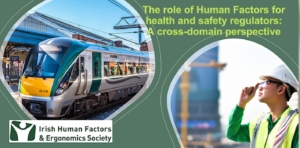
This event will be hybrid, however, we encourage everyone to attend in person!
It’s a great opportunity for members of the society to connect and get to know each other – either in person or online.
Title: The role of Human Factors for the health and safety regulator: a cross-domain perspective
Date & time: Thursday, 14 December 2023, 12:30 – 14:00 GMT
Location: TU Dublin, Grangegorman Campus, Central Quad, CQ308
Panel Speakers followed by Q&A session
First Speaker: Shane O’Duffy, Railway Safety Inspector, National Safety Authority for Railways
Title: New requirements of human and organisational factors to be included as part of a railway organisation safety management systems that the National Safety Authority for railways will assess and supervise.
Bio: Shane O’Duffy currently works for the National Safety Authority for Railways (Commission for Railway Regulation in Ireland) as a Railway Safety Inspector for over 10 years, carrying out regulatory oversight duties of railway organisation’s Safety Management System. Previously he worked in the aviation, semi-conductor, construction and pharmaceutical industries in engineering maintenance with 15 year’s industrial experience. He has qualifications in aircraft maintenance, automation and control engineering and civil engineering. More recently he attained a MSc in Railway Systems Engineering & Integration through the University of Birmingham. He is a member of Institute of Engineers Ireland and associate member of Institute of Railway Signalling Engineers.
Abstract: The National Safety Authority (NSA) plays an important role in safety oversight of railway organisations (RO’s) operating within their European Union (EU) Member State. The NSA is tasked with assessing and supervising RO Safety Management System’s (SMS’s), ensuring compliance with standards and legislative requirements. This review concentrated on a data analysis of NSA supervision activities and audit outcomes to enhance the NSA in monitoring RO SMS’s. This research examined broadly accepted approaches to measure or indicate if an SMS is effective and reviewed current practices and studies linking SMS with safety culture. The analysis of NSA data and literature reviewed, found a correlation that competence management and risk management were the two most problematic areas of the SMS. The implications of these findings for the NSA are further discussed.
Second Speaker: Dr Joan Cahill, Occupational Health, Health and Safety Authority
Title: Protecting Vulnerable Workers. Human Factors at the sharp end.
Bio: Dr Joan Cahill leads the “Enterprise and Employee Support” unit at the Health and Safety Authority. Joan has over twenty-five years’ experience leading human factors research and consultancy projects across multiple industry sectors. Joan is passionate about occupational safety and health, human factors, safety science, ethics, and responsible work.
Abstract: Every worker has the right to a safe workplace where any risks to their health and safety are properly controlled. Some workers are more vulnerable to occupational safety and health (OSH) risks due to a variety of personal and job factors. It is important that employers recognize these vulnerabilities and take steps to protect their employees from occupational safety and health hazards. In this presentation Dr Cahill will provide an overview of vulnerable workers, employer responsibilities in relation to protecting vulnerable workers, and protection practices.
Facilitated by Dr Marie Ward, Dr Maria Chiara Leva and Dr H. Diego Estrada-Lugo
Dr Marie Ward is the chair of the Irish Human Factors and Ergonomics Society and the Health Systems Learning and Research facilitator at St James’s Hospital and Adjunct Assistant Professor at the Centre for Innovative Human Systems TCD.
Dr Chiara Leva is the lead of the Human Factors In Safety and Sustainability group, TU Dublin.
Dr H. Diego Estrada-Lugo is a researcher of the Human Factors In Safety and Sustainability group, TU Dublin.
IHFES LunchNLearn November webinar_A Smart District Approach to Citizen Health and Wellbeing
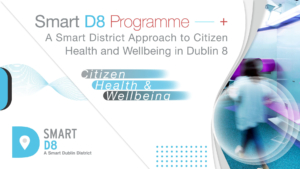
Date – 30th of November at 13:00 to 13:50 GMT
Topic – A Smart District Approach to Citizen Health and Wellbeing
Bio – Jack Lehane
Jack Lehane is the Smart D8 Ecosystem Manager, and is responsible for coordinating and overseeing the successful delivery of the Smart D8 Programme. Jack completed his PhD at University College Cork alongside Design Studio and lecture contributions at Cork Centre for Architectural Education (CCAE), after which he has contributed to a variety of project interests including healthy and platform urbanism, holistic systems approaches to built and digital environments, community-engaged praxis and policy reform.
Description: Smart D8 is a smart district and urban demonstrator to solve health and well-being challenges with citizens and service providers in the Dublin 8 district through matchmaking use cases with technologies — which then aim to scale locally, nationally and internationally. Healthcare delivery is challenged by the rise of chronic diseases, ageing populations, workforce shortage and unplanned emergencies, and requires putting already limited resources into retrospectively healing people who are already sick. By taking a prospective healthcare approach to population health, Smart D8 leverages technological innovation and data-driven insights to engage populations at scale to limit the number of people who would have ended up getting sick in the first place. With a catchment area of 43,000, Smart D8 provides a unique opportunity for indigenous and international innovators to investigate how smart technology and innovative approaches can be used to improve health and wellbeing in an urban population. See more at: www.smartd8.ie
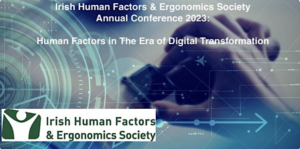
Irish Human Factors & Ergonomics Society Annual Conference 2023:
Human Factors in The Era of Digital Transformation
For Registrations : https://www.eventbrite.com/e/570651232197
Date: Full day conference, Monday 12th June 2023
Venue: TU Dublin Central Quad Grangegorman, Dublin 7, D07 ADY7.
Programme is now available:
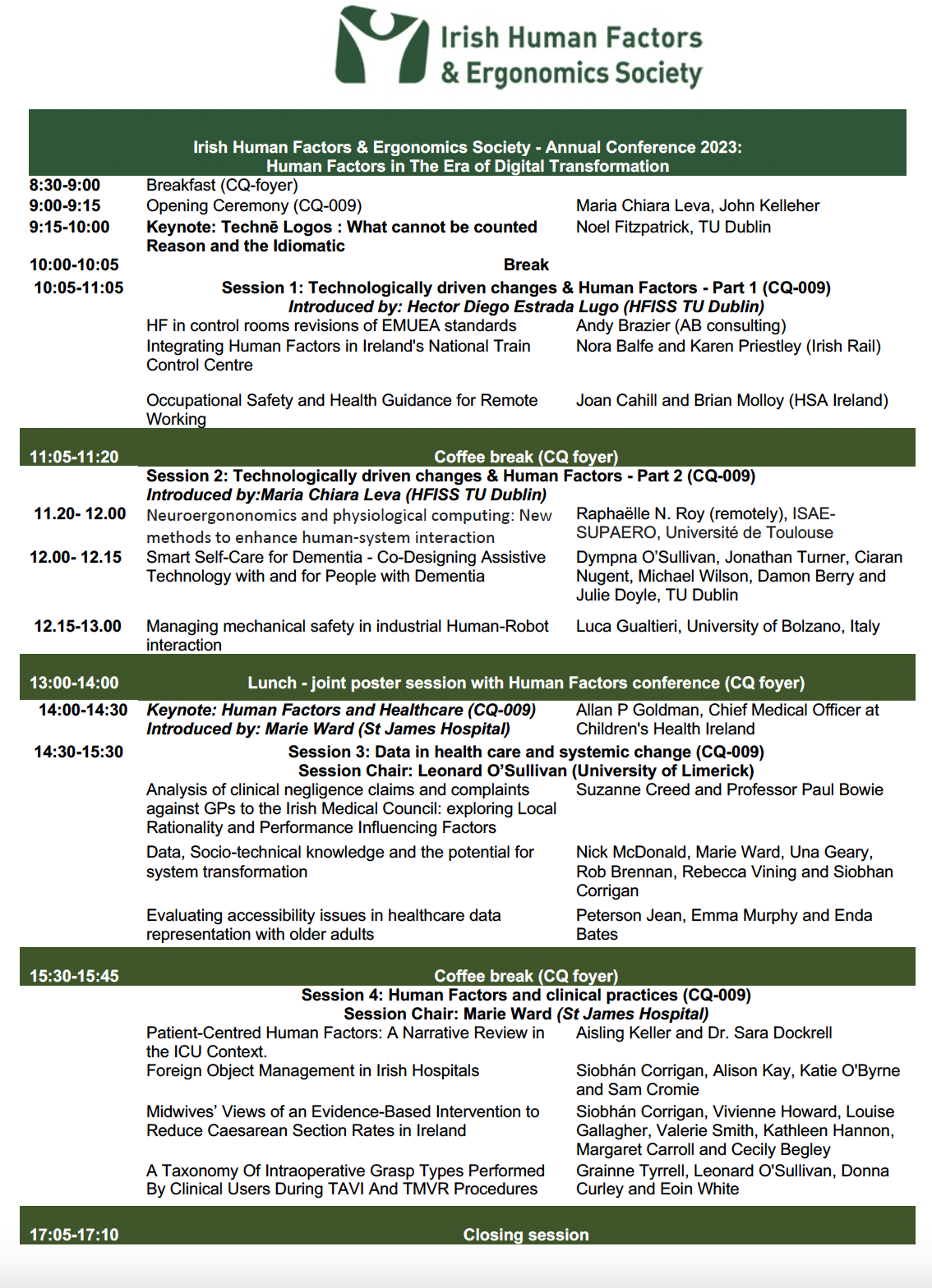
Please find below the template for the full paper submission and extended abstract submissions:
IHFES March 2023 Lunch N Learn webinar
Date – 30th of March at 13:00 to 13:45 GMT
Topic – A Systems Approach to Patient Handling Risk Management in Long Term Care
Bio – Ingrid Magro
Ingrid Magro is a physiotherapist and an ergonomist by profession and also holds a specialization in the Care of the Older Person with over 25 years work experience in the area. Her main practice is within the Elderly Long Term Care Sector and she currently leads the physiotherapy services for the Community Residential Homes within the Active Aging Community Care, an entity providing Community Care services to Older Persons in Malta.
Description: The progress and increased complexity of the care offered with the health and social services sector over the last decades has contributed to creating an ever increasing challenge for healthcare professionals to ensure the safety of their patients. The use of a human factors approach and systems thinking is now accepted as a valuable method in developing safe programs of care and decreasing the risk for errors and other adverse events. The research being presented utilize a systems framework to investigate patient handling risk management within the long term residential care sector.
IHFES February (March) 2023 Lunch N Learn webinar
Date – 1 March 2023, 4pm – 5.30pm
Topic – International Perspectives in Healthcare: A look at human factors in healthcare in a trio of countries
In this webinar, the third in our series of collaborative events between the CIEHF and the Israel Human Factors and Ergonomics Association (IHFEA), this time with the additional collaboration with the Irish Human Factors & Ergonomics Society, we get insight into the breadth, understanding and integration of human factors in the healthcare systems of three countries: Israel, Ireland and Scotland and the UK more genarally.
Dr Paul O’Connor gives an overview of the extent to which human factors has penetrated the Irish healthcare system, the challenges to the greater integration of human factors and the future opportunities.
Dr Joan Geiger talks about ‘Ergonomics by the Book: Regulations and Practice’. While we all know how beneficial ergonomics can be in the workplace, in medical institutions and elsewhere, we also know there’s often a gap between ergonomics principles and workplace implementation. We’ll look at the regulatory aspects of healthcare ergonomics in Israel – including some inheritance from pre-1948 Britain! And the steps taken to put those principles into practice in today’s workplace, particularly the healthcare work setting.
IHFES January 2023 Lunch N Learn webinar
Date – 26th of January 13.00- to 14:00 GMT
Topic – Assessing workload in air traffic control environments
Presenter: Patricia López de Frutos, Principal R&D Engineer at CRIDA. Holds M.S in Aeronautical Engineering and has a working experience of 20 years in the Air Traffic Management (ATM) domain. Her background is on validation of ATM concepts through the use of different techniques (serious gaming, fast time simulation and real time simulation) and Air Traffic Controller (ATCO) Workload modelling and assessment. She coordinates CRIDA participation in the Single European Sky Programme and is responsible for the Human Factors activities developed in CRIDA. It is remarkable her participation as project manager in the development of supporting tools to assess and predict ATCO mental workload for ENAIRE.
Abstract of talk: COMETA (COgnitive ModEl for aTco workload Assessment) is a computerized model to estimate and predict the ATCo MWL. COMETA follows a cognitive system approach based on an ATCo Psychological Model that considers two main components: the functional structure of the controller cognitive system and the attentional resources needed for its functioning to carry out the air traffic management tasks.
There are two different versions of COMETA: a version based on ATC events to estimate MWL (post-ops) and a version based on ATCO mental abstractions to predict MWL namely cognitive complexity. First version can be used to estimated airspace capacity of a particular sector and the second version to predict hotspots and hence apply the most suitable measure to mitigate that situation.
IHFES December 2022 Lunch N Learn webinar
This event will be hybrid, however, we encourage everyone to attend in person.
Title: Shift Handover & Human Factors: cross sectoral perspectives
Aim: To explore how Human Factors can contribute to designing and improving Handover
Panel Speakers followed by Q&A session
Energy Sector: Aidan Fagan Commercial Risk Manager ESB Generation
Emergency Response: Laurence Skelly Retired Dublin Fire Brigade Officer
Healthcare: Dr Cormac Kennedy, Consultant Pharmacologist and general physician at St James’s Hospital, assistant director of the Wellcome – HRB Clinical Research Facility at St James’s Hospital & Dr Cora McCaughan Assistant National Director, Healthcare Audit, Internal Audit Division at Health Service Executive.
Facilitated by Dr Maria Chiara Leva and Dr Marie Ward
Dr Maria Chiara Leva is the chair of the Irish Human Factors and Ergonomics Society and lead of the Human Factors In Safety and Sustainability.
Dr Marie Ward is the Health Systems Learning and Research facilitator at St James’s Hospital and Adjunct Assistant Professor at the Centre for Innovative Human Systems TCD.
IHFES November 2022 Lunch N Learn webinar
Date – Thu, 24 November 2022, 13:00 – 14:00 GMT
Title: Soma Design – intertwining aesthetics, movement and emotion in design work
Presenter: Kristina Höök is a Professor in Interaction Design at the Royal Institute of Technology and also works part-time at RISE. Höök has published numerous journal papers, books and book chapters, and conference papers in highly renowned venues. A frequent keynote speaker, she is known for her work on social navigation, seamfulness, mobile services, affective interaction and lately, designing for bodily engagement in interaction through soma design. Her competence lies mainly in interaction design and user studies helping to form design. She has obtained numerous national and international grants, awards, and fellowships including the Cor Baayen Fellowship by ERCIM (European Research Consortium for Informatics and Mathematics), the INGVAR award, she is an ACM Distinguished Scientist and elected ACM SIGCHI Academy. Höök is a horseback rider, mother, grandmother, and feminist.
Description : We are at a watershed moment: our relationship to technology is about to undergo a dramatic and irreversible shift. With the rise of ubiquitous technology, data-driven design, and the Internet of Things, our interactions and our interfaces with technology will look radically different in the years ahead, incorporating changes like full body interaction, shape-changing interfaces, wearables, and body- and movement-tracking apps. I will discuss how we approach this challenge through Soma Design — a process that allows designers to examine and improve on connections between sensation, feeling, emotion, subjective understanding and values — and their relationships to technology. I will argue that by engaging in a soma design process we can better probe which designs lead to: deepened somatic awareness; social awareness of others in the environment and how they are affected by the human-technology assemblage; enactments of bodily freedoms rather than limitations; making norms explicit; engage with a pluralist feminist position on who we are designing for; aesthetic experience and expression; and, ultimately an aesthetic and ethical position on how to design for being human.
Title: Applying a soma design methodology to design interventions for aircraft passenger comfort
Presenter: Dr Mahnaz Sharafkhani is currently a research assistant at Human Factors in Safety & Suitability (HFISS). She was a Marie Curie Early Stage Researcher at the institute for Aerospace Technology, University of Nottingham, UK. Her PhD was in Human Factors. She was exploring the use of a soma design methodology to design interventions for aircraft passenger comfort. She obtained her BSc and MSc in Industrial Engineering. She was a visiting researcher at interaction design lab, KTH Royal Institute of Technology when she learnt about Soma Design!
She has been involved in several scientific conferences and public outreach. She was a co-chair of the Woman in Aerospace and Aviation Charter (WiAAc), UoN branch to support the ongoing University of Nottingham’s commitments to Equality, Diversity, and with a focus on these areas in the aviation and aerospace domains.
Description : The purpose of this talk is to highlight that Soma Design methodology may serve as a powerful tool for designing and evaluating targeted comfort interventions as part of practical ergonomics research, especially when informed by additional constraints such as target areas of the body, and posture/space limitations, and for gaining very rich qualitative feedback about the efficacy of those designs. I, therefore, argue that soma design can and should be added to the toolkit of design and evaluation methods found in modern ergonomics research.
Register:
IHFES October 2022 Lunch N Learn webinar
Date – Friday, October 28, 2022 at 13:00 – 13:45 IST
Topic – Digitalisation and risk assessment – a new ball game?
Presenter: Tim Tregenza. Network manager at European Agency for Safety and Health at Work. Responsible for coordinating EU-OSHA activities with the international community and for the national tripartite networks in Member States
Description: The purpose of the session is to highlight that the world of work – and of occupational safety and health management is changing – bringing new opportunities and challenges. Themes include digital OSH management (including the use of data from smart wearables and other technology, management of remote workers, management of platform workers.
IHFES October 2022 Lunch N Learn webinar
Date – Friday, October 28, 2022 at 13:00 – 13:45 IST
Topic – Digitalisation and risk assessment – a new ball game?
Presenter: Tim Tregenza. Network manager at European Agency for Safety and Health at Work. Responsible for coordinating EU-OSHA activities with the international community and for the national tripartite networks in Member States
Description: The purpose of the session is to highlight that the world of work – and of occupational safety and health management is changing – bringing new opportunities and challenges. Themes include digital OSH management (including the use of data from smart wearables and other technology, management of remote workers, management of platform workers.
IHFES September 2022 Lunch N Learn webinar
Date – 29th September 2022 at 13:00 – 13:45
Topic – Human-Robotic Collaboration: Opportunities and Challenges
Presenters: Dr Valeria Villani. Professor (Assistant) at Università degli Studi di Modena e Reggio Emilia
Description: Easy-to-use collaborative robotics solutions, where human workers and robots share their skills, are entering the market, thus becoming the new frontier in industrial robotics. They allow to combine the advantages of robots, which enjoy high levels of accuracy, speed and repeatability, with the flexibility and cognitive skills of human workers. However, to achieve an efficient human–robot collaboration, several challenges need to be tackled. First, a safe interaction must be guaranteed to prevent harming humans having a direct contact with the moving robot. Additionally, to take full advantage of human skills, it is important that intuitive user interfaces are properly designed, so that human operators can easily program and interact with the robot.
Link to recording
Passcode: u1qh$KM^
IHFES June 2022 Lunch N Learn webinar
Date – Thursday 23rd June at 13:00 – 13:45
Topic – User-Centred Design of Exoskeletons.
Presenters: Professor Leonard O’Sullivan, School of Design, Health Research Institute, SFI Funded Investigator CONFIRM, University of Limerick.
Link to this webinar’s recording: https://us06web.zoom.us/rec/share/2bwsUHIkjEflQF9eXhe6R-_U_8eHsPTioiU4iwH6aDOHled94086QezScEk8fcF6.zUVxXyo414Uh6hXC
Passcode: .5v7=2wS
Description: Exoskeletons, as forms of wearable robotics technologies, offer the potential to assist workers in performing manually demanding jobs. This webinar explores recent advances in industrial exoskeleton development with a focus on the performance of these technologies in reducing body effort during manual work. The address also details opportunities and challenges for the technologies, especially in relation to user-centered design and technology acceptance.
IHFES at ESREL 2022
This year the Irish Human Factors and Ergonomics Society (IHFES) will run their annual event as a session within a big international conference ESREL 2022 (see www.esrel2022.com ) running in TU Dublin and Trinity college this coming 28th of August-1st of September.
If any of you may be interested in participating and submitting a paper or an extended abstract there is a special session on transport also see https://www.esrel2022.com/abstract (deadline is 10th of May don’t worry about the deadline for the abstract submission you can go directly to extended abstract and or paper).
ESREL is the biggest European event in the area or Risk and Reliability Analysis and Safety Management, hopefully this year we will also have the president for the EU osha to join us and many other relevant keynotes and special sessions (even our Health minister). This year the conference will have a special focus on: “Understanding and Managing Risk and Reliability for a Sustainable Future”.
It is the main event organised by the European Safety and Reliability Association (ESRA).
The conference is well established international and even during the pandemic in France in 2021 it was attended by over 600 people 400 of them in presence. We hope that in 2022 the number of attendees in physical presence will be of over 600 or so. We have received over 600. abstracts for it already.
We normally have session on Human Factors and it would be very good if you guys would like to take part in it.
We hope to hear from you soon.
IHFES April 2022 Lunch N Learn webinar
Date – Thursday 28th April at 13:00 – 13:40
Topic – Human Factors in Healthcare Artificial Intelligence
Free
Registration is necessary. Register here
This Lunch n’ Learn will introduce the CIEHF White Paper ‘Human Factors in Healthcare Artificial Intelligence’. The aim of the white paper is to promote systems thinking among those who develop, regulate, procure, and use AI applications, and to raise awareness of the role of people using or affected by AI. The paper will be introduced through a conversation between Dr Marie Ward PhD, Health Systems researcher at St James’s Hospital and Adjunct Assistant Professor at the Centre for Innovative Human Systems at TCD and Dr Donal Sexton MD PhD, Consultant Nephrologist and Kidney Transplant Physician at St James’s Hospital Dublin and Associate Professor at TCD.
You do not need to have any knowledge of AI to attend!
IHFES November Lunch N Learn webinar
Date – Thursday November 26th 13:00 – 13:40
Topic – Remote working: experiences from a fast and forced transition.
Free
Registration is necessary by November 25th. Register here
Presenters
13.00: Managing remote working in the pandemic: experiences from a HSE training project.
Marian Jennings, Solicitor, TU Dublin School of Business, & Dr Maebh Coleman, e-learning Teaching Fellow, TU Dublin
13.20: Company Approaches To Managing a ‘Working from Home’ Ergonomics Programme.
Muriel Johnson, partner & physiotherapist in ergonomics and occupational health, Occupational Physiotherapy Solutions Ltd
Member only access as of January 2021
Monthly Lunch-N-Learn webinars will be restricted to members of the Society as of January 2021. Not a member? Sign up – Visit here
H – Workload
The 4th International Symposium on Human Mental Workload: Models and Applications (H-WORKLOAD 2020) will be held in Granada, Spain (3-5 December, 2020) at the University of Granada. Further details are here.
